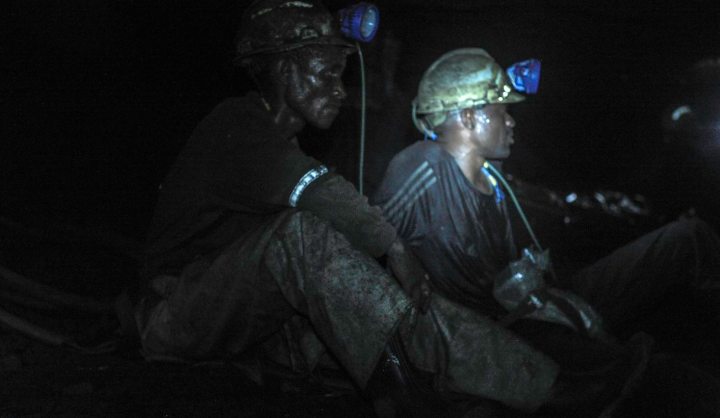South Africa
Chamber of Mines: Acknowledging atrocities in attempt to move forward

Chamber of Mines president Mike Teke acknowledged its brutal past on Wednesday as the mining industry faces empowerment regulations, wage negotiations and South Africa’s largest class action case, and is under continuing scrutiny for its past treatment of workers, and Marikana. There are no answers for some of the damage caused, he said, but there’s hope for the future. By GREG NICOLSON.
Mike Teke was speaking at the annual general meeting of the Chamber of Mines at the end of his second term as president. He said South Africa’s 130 years of mining “has mostly been bleak, caught in violent storms”. Teke, deviating significantly from his 2015 speech, which focused on the state of mining, its challenges and opportunities, said it’s time for reflection.
“I yearn for the South African mining industry to continue on a journey to greatness. If we follow the right approach, our advocacy will take us in a direction that is to the benefit not only of the industry alone but, on balance, to the benefit of our society more broadly,” said Teke, balancing hope for the future with admissions on the mining industry’s shameful past. “But, in my view, we have to acknowledge, perhaps more than the industry has done previously, including in its testimony to the Truth and Reconciliation Commission, the other side of that legacy.
“The enormity of the task that faces us in that regard is immense. In fact, there are some aspects that defy rehabilitation,” he said.
Teke acknowledged the many miners who have lost their lives at work and “the untold numbers lost to occupational disease, including silicosis and tuberculosis”, many of whom returned home from work sick and whose identities may never be known. Speaking of the human loss, Teke also noted “the pain suffered by women as mothers, sisters and wives”, whose husbands went to work on the mines and in some cases never came back.
“And this leads to another legacy of the industry which raises challenges that so far seem beyond our ability to repair. The migrant labour system was part of the foundation of the country’s primary industries – mining and agriculture. Its adverse social and economic consequence became part of the fabric of our society. We have barely begun to even conceptualise what solutions may be,” said Teke.
“We acknowledge that we created our own legacies. Some were great and positive. But at the time we created the legacies that have become the proverbial rods for our own backs. We created Fanagalo, we created hostels, we separated breadwinners from their families. And we managed mines on which many workers died,” he said.
Noting mining’s role in the country’s development, he said many leaders – Cyril Ramaphosa, Gwede Mantashe, Kgalema Motlanthe, Patrice Motsepe – had come out of the industry. But he admitted the sector often made life more difficult for those leaders.
Teke, who was re-elected as Chamber president, was speaking while the industry is under pressure on a number of fronts and has been under intense public scrutiny since the Marikana massacre.
The Chamber also released its integrated financial statements for 2015 on Wednesday, which said half of its members made losses last year, largely due to falling commodity prices and higher costs, leading many companies to restructure operations.
The largest platinum producers will soon enter wage negotiations. The last round of negotiations in 2014 saw the Association of Mineworkers and Construction Union go on strike for five months, which significantly hampered platinum producers’ results and weakened the economy, but were hailed as a significant show of strength for the union and workers.
The industry’s challenges are amplified by uncertainty over the “once empowered, always empowered” disagreement. The department of mineral resources wants companies to continue to meet black ownership targets even if they have met them in the past but have since fallen below the 26 percent threshold, while the companies believe they have done their duty. The matter is currently in court. At the same time, the industry faces what could be huge compensation costs as the class action suit over silicosis and tuberculosis claims against gold mining companies, dating back to 1965, was certified in court last week to proceed.
“Mining cannot forever allow itself to be a focus of discontent and disdain from the rest of our society. But it remains one of South Africa’s most important sources of investment, jobs, foreign exchange earnings, tax revenues,” said Teke, calling for partnerships between all stakeholders to address challenges and take advantage of opportunities.
“It is time to change the course of our journey, so our children can be proud of us, and the history we are making for them.”
Teke said that, given the industry’s terrible past, no one could say that there have not been improvements. He noted upgrades to hostels, efforts to improve health and safety, including on occupational lung diseases, empowerment partnerships, the increased number of skilled black workers, increased procurement from black-owned companies, and the need for companies to take lessons from the Marikana Commission of Inquiry report.
Speaking at the event, Mineral Resources Minister Mosebenzi Zwane reportedly encouraged the industry to improve empowerment from the bottom up. He said the Minerals and Petroleum Resources Development Act, which has continued to be delayed, will be completed in 2016.
Teke’s comments might find favour with the department, but also valid scepticism. They are unlikely to overturn perceptions of “discontent and disdain” towards the industry. It’s too little, too late, and while the industry is making changes, only when it is clearly making a positive impact, which will have to be broadly noticeable, can the industry begin to bridge the trust deficit created by the brutal actions of the distant and recent past. DM
Photo: Workers underground at Lonmin Rowland Shaft setting up for drilling and later drilling. (Greg Marinovich)

















 Become an Insider
Become an Insider